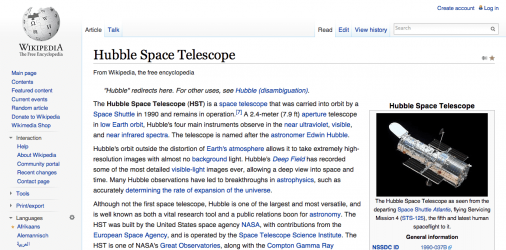- Sep 22, 2013
- 4,956
- 250
- 85
Has modern globalization infrastructures such as Wikipedia (free online encyclopedia) made communications-themed 'avatars' such as Blurr (fast-talking and fast-driving fictional A.I. robot from Hasbro's Transformers) representative of new age intellectualism-folklore?
====
The modern world is media and labor gauged and intellectual property and goods in this commercial environment are important and valuable. We think about the EPA, the FDA, the NSA, the IRS, and the CDC. We think about institutions that create traffic and transit securities and make consumerism secure and healthy (even nutritious!). Today's students learn about the ramifications of networking-oriented contracts and companies investing in Earth goods.

Wikipedia has emerged as a symbolic/iconic 'modernism resource.' Wikipedia is the world's only/best free and peer-edited online encyclopedia, featuring articles/entries about everything you can think of under the sun. Any student can walk into a public library and log onto the Internet and surf Wikipedia pages before looking for more thorough readings in hard-books. Wikipedia is reliable and respected, since its peer-editing system is meticulous and reviewed through multiple references. It's a professional social access site signifying our new age interest in networking-themed 'customs.'

Computers changed everything. Once we invested in computing technologies after inventing basic 'precursors' such as the calculator, the intercom, and the digital clock, we sought ways to make machines 'think' like humans and assist us in efficient/fast cataloging of information and knowledge. Soon, computers became part of the global 'Internet' and facilitate commerce and social communications. We became interested in the 'concept' of automated-intelligence and human-like 'computations' and we turned our attention to the concept of A.I. (Artificial Intelligence) and robotics and how automated production could be likened to farming itself. We invented 'avatars' that reflected our new age fascination with sophisticated social functions (e.g., eTrade, Facebook) such as Ultra Magnus and Cyclonus (two fictional robots from Hasbro's Transformers entertainment-franchise who represent diligence and individualism).

So where will all this networking-themed socialization-intrigue involving the use of computers/Internet take our traditions/customs regarding the sanctification and celebration of old-world libraries? Before the Internet, we had libraries to entreat our sensibilities regarding the access to materials/information. If we look at an iconic American college/university library such as the one at Johns Hopkins, we might find a 'wealth' of information/knowledge at our fingertips, which might compel us to evaluate why/how Wikipedia has become a symbol of 'traffic evolution.'

Modern media is about social knowledge and customs. We enjoy lifestyle-assistance American TV programs such as Dr. Phil and legal/political access networks such as C-SPAN. Modern geo-customs are now 'wed' to ideas about lifestyle, commerce/consumerism, and interactive politics. EWTN (Catholic-TV) and Al Jazeera (Muslim-TV) capture our globalization-politics interest in networking-based relations/contracts. What therefore is the 'aesthetic new deal' (in terms of democracy-marketing and Wikipedia-prestige)?

Consumerism has replaced the campfire, and today's kids want water-guns, robot-toys, dollhouses, and video-games which capture civilization fascination with traffic idealism. You can buy Christmas toys online now, making social customs even easier to embrace. Modern geo-customs have been radically reoriented thanks to computerized networking and globalized commerce. Everyone thinks about the value of Facebook, Amazon, NASDAQ, and Wikipedia. If an intelligent alien species were to make contact with humanity and inquire about our 'social customs' and integrity, we might tell them about the global value of commercial artifacts (e.g., Napster).

ALIEN: Your civilization is capitalism-biased!
HUMAN: We do care about commerce-gauged peace.
ALIEN: Is your World Bank a respected institution?
HUMAN: The American President (Donald Trump) cares about trade.
ALIEN: What is the global prestige attached to Al Jazeera?
HUMAN: The Muslim world cares about keeping pace with Western media!
ALIEN: Why are Americans so fascinated by celebrities and magazines?
HUMAN: Commercial traffic makes consumerism feel like a lifestyle 'gymnasium.'
ALIEN: What kinds of sci-fi horror-films are popular in the West?
HUMAN: Alien: Covenant is a recent film about humans and frightening smart aliens.
ALIEN: What is the 'covenant' between humans and the Earth itself?
HUMAN: We try to honor the Environmental Protection Agency through democracy!
ALIEN: Do students feel like they're being trained to navigate on Wikipedia?
HUMAN: Today's teachers use multimedia to encourage students to embrace tech.
ALIEN: Does all this networking/globalization improve social imagination?
HUMAN: Yes! American films such as Network, Celebrity, and Robots address etiquette.
ALIEN: What is the 'aesthetic new deal' regarding commercialism (e.g., Facebook)?
HUMAN: It seems to be one of...inquisitiveness (e.g., People Magazine)!
ALIEN: In that case, the American film Spy Game seems rather symbolic...
====

====
The modern world is media and labor gauged and intellectual property and goods in this commercial environment are important and valuable. We think about the EPA, the FDA, the NSA, the IRS, and the CDC. We think about institutions that create traffic and transit securities and make consumerism secure and healthy (even nutritious!). Today's students learn about the ramifications of networking-oriented contracts and companies investing in Earth goods.

Wikipedia has emerged as a symbolic/iconic 'modernism resource.' Wikipedia is the world's only/best free and peer-edited online encyclopedia, featuring articles/entries about everything you can think of under the sun. Any student can walk into a public library and log onto the Internet and surf Wikipedia pages before looking for more thorough readings in hard-books. Wikipedia is reliable and respected, since its peer-editing system is meticulous and reviewed through multiple references. It's a professional social access site signifying our new age interest in networking-themed 'customs.'

Computers changed everything. Once we invested in computing technologies after inventing basic 'precursors' such as the calculator, the intercom, and the digital clock, we sought ways to make machines 'think' like humans and assist us in efficient/fast cataloging of information and knowledge. Soon, computers became part of the global 'Internet' and facilitate commerce and social communications. We became interested in the 'concept' of automated-intelligence and human-like 'computations' and we turned our attention to the concept of A.I. (Artificial Intelligence) and robotics and how automated production could be likened to farming itself. We invented 'avatars' that reflected our new age fascination with sophisticated social functions (e.g., eTrade, Facebook) such as Ultra Magnus and Cyclonus (two fictional robots from Hasbro's Transformers entertainment-franchise who represent diligence and individualism).

So where will all this networking-themed socialization-intrigue involving the use of computers/Internet take our traditions/customs regarding the sanctification and celebration of old-world libraries? Before the Internet, we had libraries to entreat our sensibilities regarding the access to materials/information. If we look at an iconic American college/university library such as the one at Johns Hopkins, we might find a 'wealth' of information/knowledge at our fingertips, which might compel us to evaluate why/how Wikipedia has become a symbol of 'traffic evolution.'

Modern media is about social knowledge and customs. We enjoy lifestyle-assistance American TV programs such as Dr. Phil and legal/political access networks such as C-SPAN. Modern geo-customs are now 'wed' to ideas about lifestyle, commerce/consumerism, and interactive politics. EWTN (Catholic-TV) and Al Jazeera (Muslim-TV) capture our globalization-politics interest in networking-based relations/contracts. What therefore is the 'aesthetic new deal' (in terms of democracy-marketing and Wikipedia-prestige)?

Consumerism has replaced the campfire, and today's kids want water-guns, robot-toys, dollhouses, and video-games which capture civilization fascination with traffic idealism. You can buy Christmas toys online now, making social customs even easier to embrace. Modern geo-customs have been radically reoriented thanks to computerized networking and globalized commerce. Everyone thinks about the value of Facebook, Amazon, NASDAQ, and Wikipedia. If an intelligent alien species were to make contact with humanity and inquire about our 'social customs' and integrity, we might tell them about the global value of commercial artifacts (e.g., Napster).

ALIEN: Your civilization is capitalism-biased!
HUMAN: We do care about commerce-gauged peace.
ALIEN: Is your World Bank a respected institution?
HUMAN: The American President (Donald Trump) cares about trade.
ALIEN: What is the global prestige attached to Al Jazeera?
HUMAN: The Muslim world cares about keeping pace with Western media!
ALIEN: Why are Americans so fascinated by celebrities and magazines?
HUMAN: Commercial traffic makes consumerism feel like a lifestyle 'gymnasium.'
ALIEN: What kinds of sci-fi horror-films are popular in the West?
HUMAN: Alien: Covenant is a recent film about humans and frightening smart aliens.
ALIEN: What is the 'covenant' between humans and the Earth itself?
HUMAN: We try to honor the Environmental Protection Agency through democracy!
ALIEN: Do students feel like they're being trained to navigate on Wikipedia?
HUMAN: Today's teachers use multimedia to encourage students to embrace tech.
ALIEN: Does all this networking/globalization improve social imagination?
HUMAN: Yes! American films such as Network, Celebrity, and Robots address etiquette.
ALIEN: What is the 'aesthetic new deal' regarding commercialism (e.g., Facebook)?
HUMAN: It seems to be one of...inquisitiveness (e.g., People Magazine)!
ALIEN: In that case, the American film Spy Game seems rather symbolic...
====

